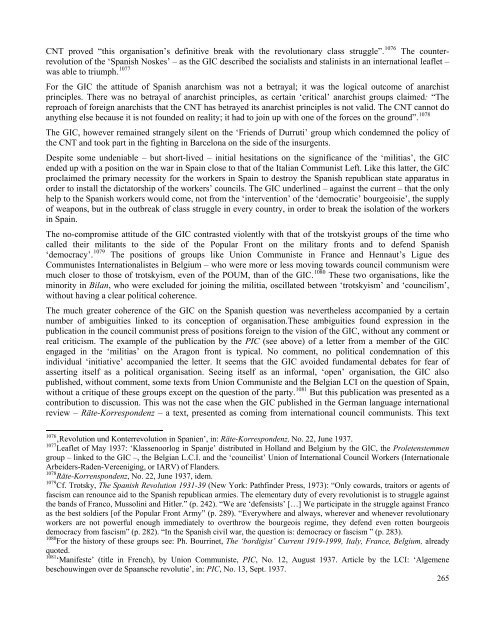The German-Dutch Communist Left - Libcom
The German-Dutch Communist Left - Libcom
The German-Dutch Communist Left - Libcom
You also want an ePaper? Increase the reach of your titles
YUMPU automatically turns print PDFs into web optimized ePapers that Google loves.
CNT proved “this organisation’s definitive break with the revolutionary class struggle”. 1076 <strong>The</strong> counterrevolution<br />
of the ‘Spanish Noskes’ – as the GIC described the socialists and stalinists in an international leaflet –<br />
was able to triumph. 1077<br />
For the GIC the attitude of Spanish anarchism was not a betrayal; it was the logical outcome of anarchist<br />
principles. <strong>The</strong>re was no betrayal of anarchist principles, as certain ‘critical’ anarchist groups claimed: “<strong>The</strong><br />
reproach of foreign anarchists that the CNT has betrayed its anarchist principles is not valid. <strong>The</strong> CNT cannot do<br />
anything else because it is not founded on reality; it had to join up with one of the forces on the ground”. 1078<br />
<strong>The</strong> GIC, however remained strangely silent on the ‘Friends of Durruti’ group which condemned the policy of<br />
the CNT and took part in the fighting in Barcelona on the side of the insurgents.<br />
Despite some undeniable – but short-lived – initial hesitations on the significance of the ‘militias’, the GIC<br />
ended up with a position on the war in Spain close to that of the Italian <strong>Communist</strong> <strong>Left</strong>. Like this latter, the GIC<br />
proclaimed the primary necessity for the workers in Spain to destroy the Spanish republican state apparatus in<br />
order to install the dictatorship of the workers’ councils. <strong>The</strong> GIC underlined – against the current – that the only<br />
help to the Spanish workers would come, not from the ‘intervention’ of the ‘democratic’ bourgeoisie’, the supply<br />
of weapons, but in the outbreak of class struggle in every country, in order to break the isolation of the workers<br />
in Spain.<br />
<strong>The</strong> no-compromise attitude of the GIC contrasted violently with that of the trotskyist groups of the time who<br />
called their militants to the side of the Popular Front on the military fronts and to defend Spanish<br />
‘democracy’. 1079 <strong>The</strong> positions of groups like Union <strong>Communist</strong>e in France and Hennaut’s Ligue des<br />
<strong>Communist</strong>es Internationalistes in Belgium – who were more or less moving towards council communism were<br />
much closer to those of trotskyism, even of the POUM, than of the GIC. 1080 <strong>The</strong>se two organisations, like the<br />
minority in Bilan, who were excluded for joining the militia, oscillated between ‘trotskyism’ and ‘councilism’,<br />
without having a clear political coherence.<br />
<strong>The</strong> much greater coherence of the GIC on the Spanish question was nevertheless accompanied by a certain<br />
number of ambiguities linked to its conception of organisation.<strong>The</strong>se ambiguities found expression in the<br />
publication in the council communist press of positions foreign to the vision of the GIC, without any comment or<br />
real criticism. <strong>The</strong> example of the publication by the PIC (see above) of a letter from a member of the GIC<br />
engaged in the ‘militias’ on the Aragon front is typical. No comment, no political condemnation of this<br />
individual ‘initiative’ accompanied the letter. It seems that the GIC avoided fundamental debates for fear of<br />
asserting itself as a political organisation. Seeing itself as an informal, ‘open’ organisation, the GIC also<br />
published, without comment, some texts from Union <strong>Communist</strong>e and the Belgian LCI on the question of Spain,<br />
without a critique of these groups except on the question of the party. 1081 But this publication was presented as a<br />
contribution to discussion. This was not the case when the GIC published in the <strong>German</strong> language international<br />
review – Räte-Korrespondenz – a text, presented as coming from international council communists. This text<br />
1076 ‚Revolution und Konterrevolution in Spanien’, in: Räte-Korrespondenz, No. 22, June 1937.<br />
1077 Leaflet of May 1937: ‘Klassenoorlog in Spanje’ distributed in Holland and Belgium by the GIC, the Proletenstemmen<br />
group – linked to the GIC –, the Belgian L.C.I. and the ‘councilist’ Union of International Council Workers (Internationale<br />
Arbeiders-Raden-Vereeniging, or IARV) of Flanders.<br />
1078 Räte-Korrenspondenz, No. 22, June 1937, idem.<br />
1079 Cf. Trotsky, <strong>The</strong> Spanish Revolution 1931-39 (New York: Pathfinder Press, 1973): “Only cowards, traitors or agents of<br />
fascism can renounce aid to the Spanish republican armies. <strong>The</strong> elementary duty of every revolutionist is to struggle against<br />
the bands of Franco, Mussolini and Hitler.” (p. 242). “We are ‘defensists’ […] We participate in the struggle against Franco<br />
as the best soldiers [of the Popular Front Army” (p. 289). “Everywhere and always, wherever and whenever revolutionary<br />
workers are not powerful enough immediately to overthrow the bourgeois regime, they defend even rotten bourgeois<br />
democracy from fascism” (p. 282). “In the Spanish civil war, the question is: democracy or fascism ” (p. 283).<br />
1080 For the history of these groups see: Ph. Bourrinet, <strong>The</strong> ‘bordigist’ Current 1919-1999, Italy, France, Belgium, already<br />
quoted.<br />
1081 ‘Manifeste’ (title in French), by Union <strong>Communist</strong>e, PIC, No. 12, August 1937. Article by the LCI: ‘Algemene<br />
beschouwingen over de Spaansche revolutie’, in: PIC, No. 13, Sept. 1937.<br />
265
















